HORROR NOIRE (2021)
Six stories of black horror.
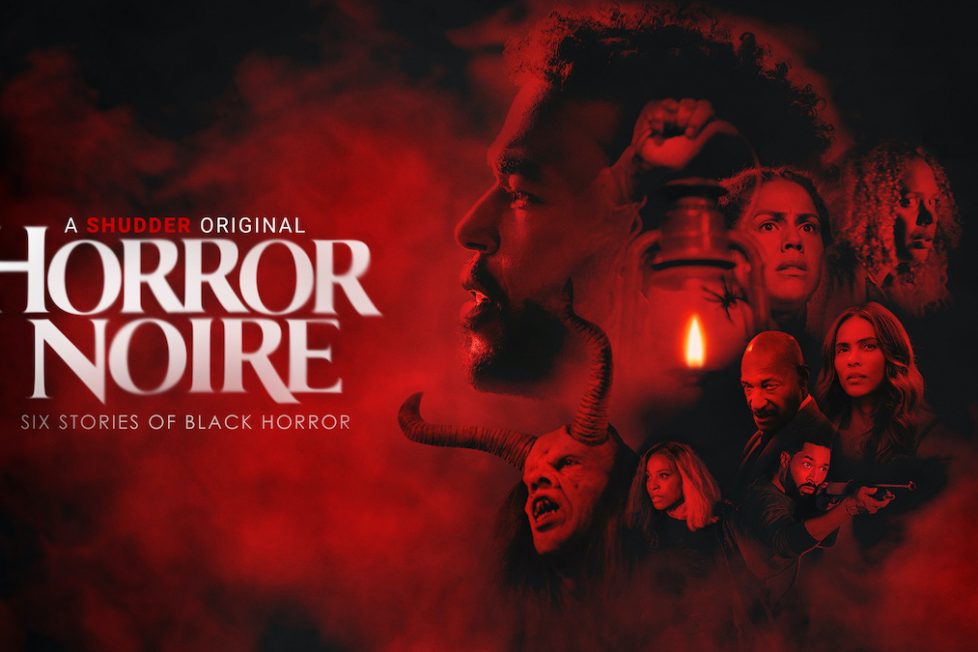
Six stories of black horror.


In the yearly squash of direct-to-streaming horrors released around Halloween, few sub-genres face quite as much competition as the anthology. Not only does each segment have to fight for the spotlight, but each anthology faces about half a dozen others promising to be the new Creepshow (1982) or Trick ‘r Treat (2007). Add to that the increasingly prevalent television counterpart to the anthology model, such as the recently rebooted The Twilight Zone and the small-screen Creepshow series, and it begins to feel like not so much a boom but an overstuffed marketplace, with each project vying for attention like a carnival barker promising audiences the strangest sights you’ll ever behold. It’s rarely true.
However, going all the way back to the impeccable and chilling Kwaidan (1965), anthology tales have nevertheless managed to thrive—notably, when they’re bound tightly together by a purer vision and a cohesive artistic intention. It’s true there’s often some charm in modern anthology films functioning like scrappy mixtapes of thrown together B sides, but it’s not often enough to make up for the lack of unity of its parts. Horror Noire, at least, evokes Kwaidan in its clarity.
Coming two years after the tremendous documentary series Horror Noire: A History of Black Horror (2019), Horror Noire presents six short horror short films, ranging from the supernatural to the psychological, each made by black filmmakers, behind and in front of the camera. The movie follows the celebratory spirit of the documentary and, as such, needs no gimmick. There’s no wrap-around story; that is, there’s no Crypt Keeper introducing each story, or a videotape on which each tale’s supposedly contained. It’s just six films, showcased and allowed to stand on their own, for better or worse. It’s bold to omit a traditional framing device, but it pays off, with each part being taken as its own work, with the audience in charge of deciding how we connect them. It also allows for a joyous range of genres and characters, proving, if it still needed to be, that black horror isn’t just one thing. As such, Horror Noire becomes more than the sum of its parts…
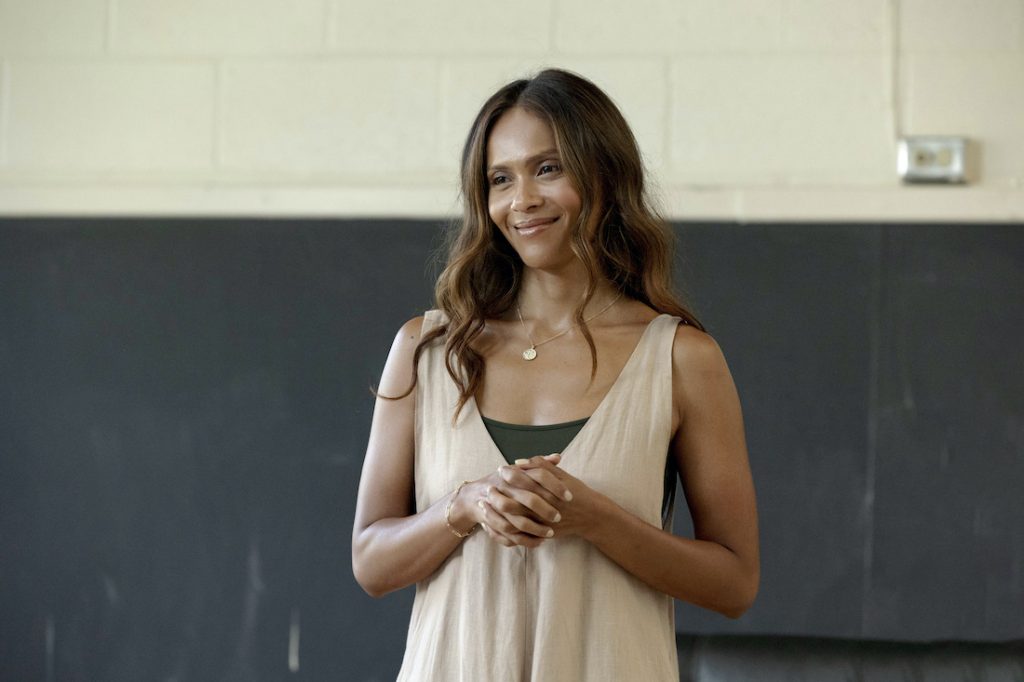

A teacher with a secret past moves to a seemingly idyllic lakeside home. But after being warned by locals to stay away from the water, the allure of a cooling swim on a hot summer’s day proves too strong…
After brief and striking opening credits, we’re introduced to our first story with a pleasingly mysterious flashback presenting us with cops and townspeople anxiously looking at something that’s been dredged from the murky depths of a lake. “Looks like it got ’em both”, remarks one of the cops, bathed in the suffocating blue air of a summer night. This, in the grand tradition of the doomed horror protagonist, is the lake where teacher Abbie LeFleur (Lesley-Ann Brandt) relocated several years later. From phone calls with her best friend, we learn that her move was somewhat impulsive and that she’s taking time to “fix herself up.” And from the way director Joe West frames her, again bathed in that smothering blue light and clutching her cat, we sense in her deep loneliness. Perhaps it’s self-inflicted, as a remote lake house isn’t the sort of place a person hoping to meet other people would move to.
Abbie was quickly warned by a local old-timer not to swim in the water, and that bad things happen when you do. The film remains cagey for most of its runtime about why the lake’s so dangerous, and it’s also mysterious what Abbie did to make her restart her life in a place such as this. Director Joe West moves the story along at a carefully measured pace and with an almost detached distance, cleverly mimicking the disconnect between Abbie and the danger she puts herself in. When she does inevitably take a dip into danger, things begin to take a turn towards the disturbing… but to say more would give away the surprises.
The last 15-minutes are when things pick up. Abbie, a reserved and somewhat inscrutable character, becomes dangerous after she hires a teenage student to be her ‘handyman’. West plays on our discomfort, as Abbie’s submerged past begins to thrash towards the surface. Thankfully, West and writers Tananarive Due and Steven Barnes don’t give in to the mystery, and the answers are left for us to piece together if we wish. A rushed and sloppy ending disappoints, but The Lake leaves an impression nonetheless. The short sucks in all manner of horror symbols—from the dangerous water of Jaws (1975) to the rambling locals of Friday the 13th (1980)—and refashions them into something distinctive and unsettling; a hybrid of ashamed sexual repression and classic monster-movie creepiness. The revelation of the lake’s powers is skin-crawling, while the placement of the short points to an underpinning concept of the film ahead, that old horror conventions can be repurposed and updated to create something new.
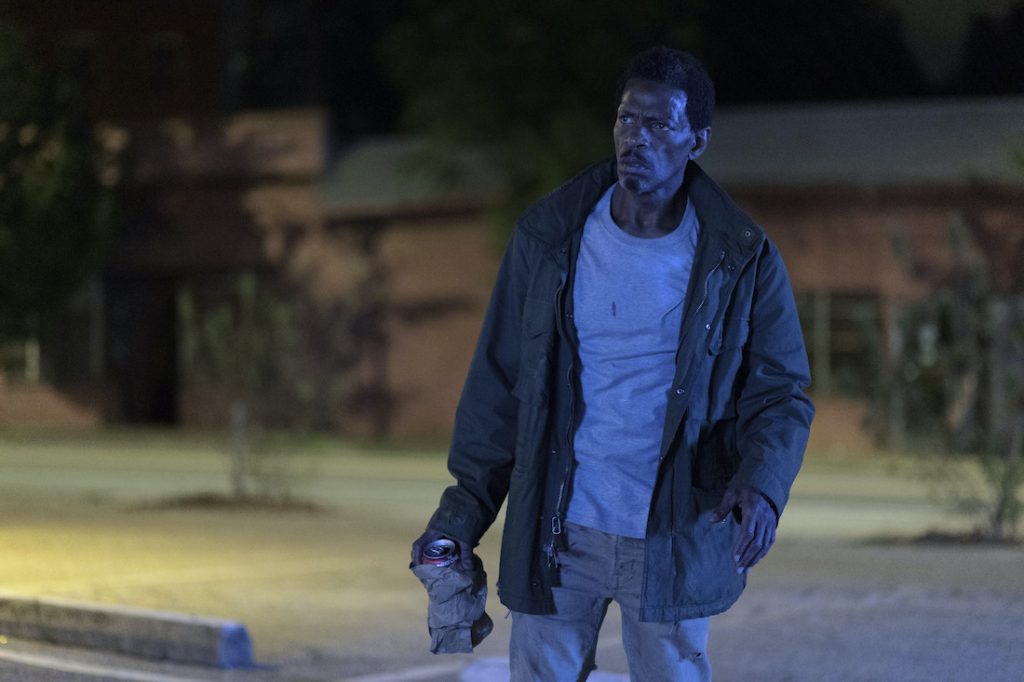

An up-and-coming graphic artist works for a food bank and creates art for his local community. However, dreaming of a life outside of his means, he takes a well-paid job offer to create symbols for a shady customer, before realising that trading his integrity for cash will have deadly results.
The second short comes from Julien Christian Lutz (Superfly), a high-profile music video director. Once a protege of the legendary Hype Williams, the filmmaker (also known as ‘Director X’) surprisingly fails to bring much in the way of style or substance to what’s a potentially sharp fable. We’re introduced to Nekani (Brandon Mychal Smith) as he works on a spray-painted mural for the food bank at which he works. He blasts music into his ears, perhaps so he might forget the ‘starving’ part of the phrase ‘starving artist’. It also blocks out the taunts of a local wino, who accuses Nekani of his aspirational, bourgeois mindset… because in reality, as Nekani’s boyfriend Cordell (Samuel-Taylor) reminds him, he’s not truly struggling to survive, he’s saving money.
Ezra Claytan Daniels’ screenplay is incisive, even when the direction itself is lacking. Nekani is pushed to make sacrifices at every turn, giving up his dream of “making it big” to support his local community. The deftness of the script presents a seemingly unanswerable issue, one that so many black artists face: is it wrong to want more? The piece soon turns into more of an outright parable, the first of the film that feels heavily indebted to The Twilight Zone. As a morality play, it’s interesting enough—but as a horror, it mostly fails. Nekani begins creating pieces of work for a mysterious client, who he only ever talks to over the phone, and before long he realises what the symbols he’s created mean and that they’re literally deadly. The suspense sequences are unfortunately awkward and vague, and each takes a step towards a climax that is unfathomably silly and undermines the weight of what’s come before.
The story has echoes of Clive Barker (and will doubtlessly draw comparisons to the 2021 Candyman remake), and it’s quite possible that in the format of a short story, or even graphic novel this would have thrived. Sadly, Lutz’s direction is shaggy and un-engaged with the material, and the appearance of an otherworldly creature in the last act is shot with such a lack of atmosphere and interest that the only reaction it’ll elicit is laughter.
What salvages this short, aside from the script, is the smaller moments between Nekani and Cordell. There’s a lived-in warmth to their relationship, and a joy to be found in the details of it all. Queer black characters in horror are shockingly under-represented, but we know that representation itself isn’t enough. Thankfully, Brand of Evil goes beyond the insultingly facile tokenism of so many horrors before it and gives its characters the depth and complexity they deserve. It’s just a shame they couldn’t have been a part of a better-executed story.
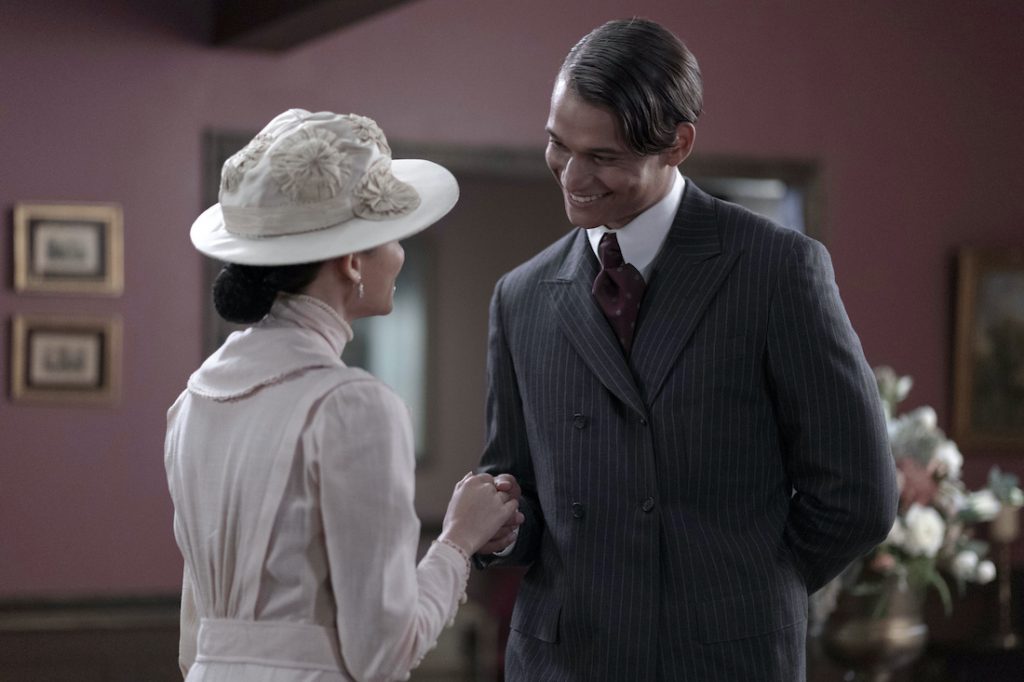

In 19th-century Washington, a wealthy housewife makes a secret deal with a witch for her child to be born male, and light-skinned. But soon after giving birth, her home begins showing signs of a haunting…
Director Zandashé Brown’s historical horror Bride Before You strikes a different tone to preceding shorts and features Horror Noire’s finest performance in Lenora Crichlow’s Mrs Clay. Though presented as a ghost story, the piece unveils itself as a fun and campy tale of madness and monsters, with foundations in disturbing historical facts. That it pulls off a careful balance of both is no mean feat.
Mrs Clay has recently married Mr Clay (Sean Patrick Thomas, a recognisable face for those choosing to remember Halloween: Resurrection), a well-to-do man of business, whose wealth is perhaps the only thing that makes him respectable to his white peers. She spends most of her days indoors, spinning cotton. “This close to the Mason-Dixon line, you’re in the South”, she says through narration, which recalls diaries written at the time by black people who were then referred to as ‘freed’. The gentle and melancholy tone of the first half of Bride Before You has an almost sweet yearning to it, as if it’s playing out as a memory it knows isn’t real, and that any happiness found in those days was short-lived, under threat, and enjoyed by only a select few.
The piece, based on a short story by Stephanie Malia Morris, works well as a short film. Unlike Brand of Evil, which felt as if it was telling too much story in too short a time, Bride Before You takes complex ideas and manages to keep them turning over in the viewer’s mind whilst also keeping the scale relatively small. Though taking place over decades, the house setting keeps the focus tight and the dread churning away. The sound design adds to the unsettling atmosphere, the walls scratching and knocking as if they were set to crumble any moment.
Such is the strength of Mrs Clay’s guilt, who like so many short story protagonists, harbours a dark secret. Although the short dabbles in the fantastical, Mrs Clay’s desire to have a child that would pass for white is not an invention—it’s a sad truth of history, and one still prevalent today. For many black and mixed-race viewers, this story will hit close to home. Perhaps some family member will have quietly hoped for a light-skinned child because, they convince themselves, it’ll make it easier on the child. But as Bride Before You suggests, whatever the reason, wishing away blackness is unconscionable. Embracing one’s blackness must be done regardless of the cultural climate—it’s a uniquely personal experience, and will be the only thing to stop the walls from tumbling in.
Bride Before You culminates in a creepy and tactile finale that neatly pulls together its ideas into a short set-piece. Like the cotton Mrs Clay weaves or the silk from the spiders in the attic, the film visualises people caught in webs they were forced to make, fighting forever to be freed.
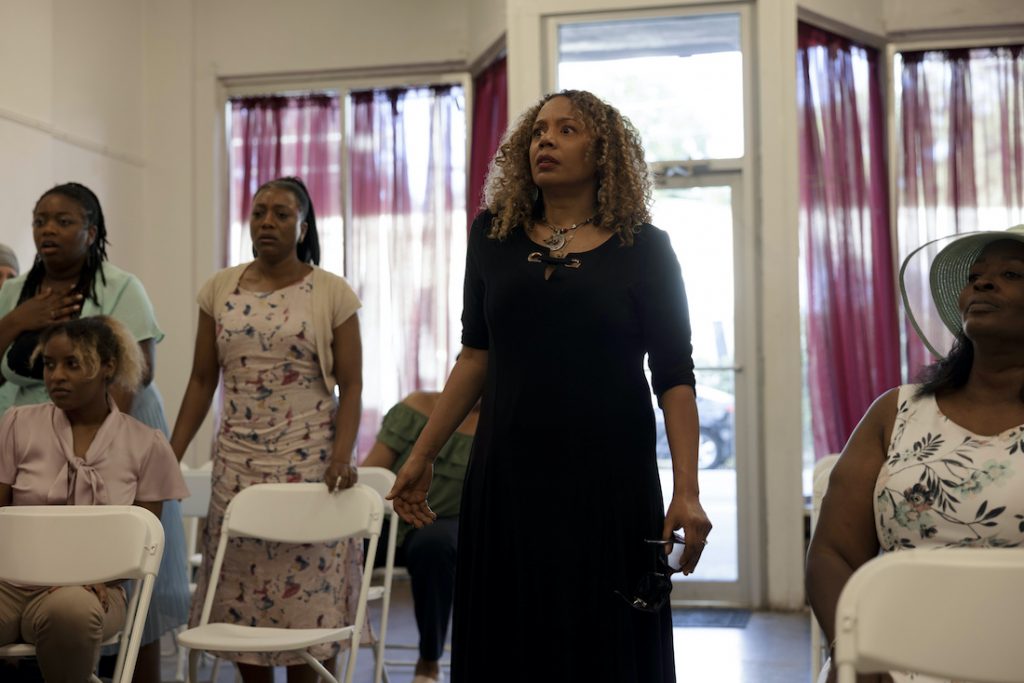

A husband and wife discuss the merits and failings of Christianity. But when the husband visits a new church he argues is a cult, he comes home a changed man.
Fugue State is unfortunately positioned in Horror Noire. At 150-minutes, it’s a testing runtime, and the mid-point is when the film hits a fatiguing lull. However, regardless of where it’s been placed, it’s hard to deny that Fugue State is by far the weakest of the bunch.
Helmed by Rob Greenlea (Grey’s Anatomy, NCIS), Fugue State would have one assume it’s an episode of a particularly low-budget TV series if you catch it out of context. Though the film as a whole is working on a low-budget, it makes up for that in storytelling and confidence—low budget doesn’t automatically mean bad. But that charm is absent from Fugue State; an artless and messy short that is as visually flat as the story is confusing. Barrett and True give it their best, and their chemistry is undeniably charming. Also effective is Barrett’s change from an eloquent journalist to a monosyllabic dolt, after visiting a new church. He goes from critical and fiery to dull and angry, making for a strong performance, particularly as we see that spark leave his eye.
But even a cameo from the legendary Tony Todd (Candyman) can’t bring clarity to the short’s ideas. It wants, seemingly, to comment on indoctrination via religion, but with little regard as to how or why that might happen. Within the story, it can barely muster an answer as to what actually changes to so rapidly zombify him. And tacked on are red-faced murderers, whom we see lurking at random intervals in the suburbs, strikingly un-scary. As in the poorest horror films, things just happen because the script says so. The film could easily have excised this chapter and lost nothing, and it might have made the runtime more palatable. It offers so little in the way of substance or even effective scares that it’s surprising it made it to the final cut. No wonder it’s called Fugue State—it was seemingly written in one.

An overly-concerned father, obsessed with the safety of his young son, begins to lose his sense of control, particularly when his boy supposedly keeps seeing a strange man in his bedroom window…
Parental anxiety is a fertile subject for horror. David Lynch’s Eraserhead (1977) abstracted that fear to horrifying results, while modern offerings such as The Babadook (2014) and The Witch (2015) played on the fear one’s child might be vulnerable to and responsible for pure evil. Daddy wisely strips back its focus to centre on the father’s fears he won’t be able to protect his son against the threats of everyday life; whether that’s talking to strangers or stepping in dog shit.
Matters aren’t helped by the ramblings of a mysterious old man who lives in his building (that’s the second wise old weirdo we’ve met in Horror Noire, if you’re counting). An encounter in a lift with him is troubling, despite his fatherly demeanour. “Becoming a father”, he says “it pulls you back to when we were living in the wilderness”. The anxieties brought to the fore, the nervous dad now has validation, a pass to be as protective (or smothering) as he likes. A neat recurring image of the man and son sitting in front of a fire, otherwise engulfed in darkness, brings the metaphor into focus—a man using primitive comparisons to justify his need to have complete control over everything.
Black fatherhood is rarely done justice on screen. Stereotypes abound of deadbeats dads, while another popular choice for lazy writers is the absentee father. Director Robin Givens pushes against these lousy, outdated tropes whilst also finding room for the titular Daddy to be deeply flawed. It’s even suggested that his desire to keep his son safe, to be a good father, is a reaction against so many racist notions of black fathers. Daddy is emotionally equipped to tackle those fears, with Luke James selling the panic and desperation of young fatherhood with such humanity. It’s a shame that Daddy ends up feeling slight, trading in its grounded premise for a surprise ending that can be spotted a mile off.
And it’s a shame, too, that it uses metaphor once again to hammer home a point that we would have understood regardless. It’s a pity that so many of these short films feel the desire to function as overt parables or moral tales, when in reality, just about any horror story can be read as such. It feels unnecessary to rely on ironic twists so heavily. What should be a natural story development ends up feeling like a device to deliver a message.
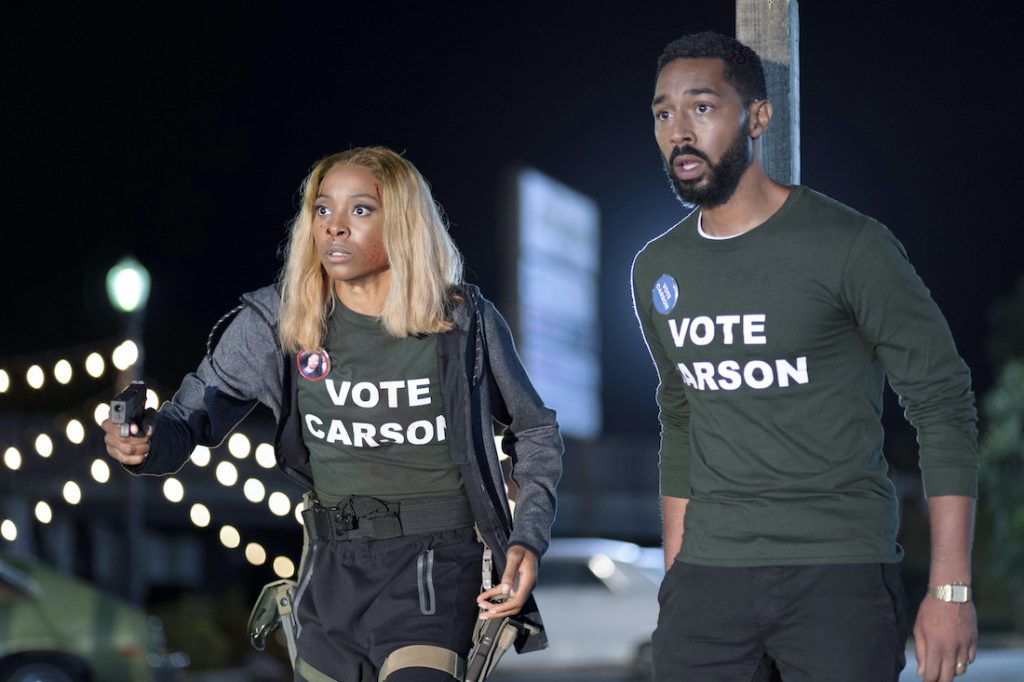

While canvassing for a political candidate in a small, conservative town, couple Shanita and Marcus are faced with hostility… which turns into outright violence when the sun goes down.
Talk about saving the best for last. Sundown is unquestionably the finest offering; a fun and spirited treat, and the first entry so far to possess a wicked sense of humour. From Bodybags (1993) to Tales from the Hood (1995), anthology horrors have often foregrounded their humour to complement the terror, particularly those films more keenly aware of the inherently camp and playful nature of telling a short, scary story.
Sundown is perfectly calibrated to work as a horror-comedy. The precise put-downs from Erica Ash’s Shanita all land, while a cameo from the great Peter Stormare as the town’s violin playing, Deep-Southern-drawling mayor is deliciously camp. Director Kimani Ray Smith balances tone spectacularly well, refusing to shy away from the harsh realities of both out and out racists (the town has a sign up warning away black people) and neo-liberal deniers (“Hey, I’m out here campaigning for a black candidate, things have changed”, claims one of the white canvassers).
However, Smith has a lightness of touch and a clear love of Gothic horror which keeps the short from staying too long, and it moves almost giddily towards its reveal. And when that comes, Sundown shifts gear and runs with it. A shortcoming of many segments of anthology horrors finds writers backing themselves into corners with desperate reveals, followed by abrupt endings. In Sundown, the reveal is placed perfectly in the middle, giving us enough time to align ourselves with characters beforehand, and enough time afterward to enjoy the mayhem. The action itself is the best of the film, lively and animated, and allowing for perfect character beats within it. Of all the shorts, it’s the most fully realised and skilfully weaves its message into a tremendously fun genre piece.
USA | 2021 | 120 MINUTES | 1.78:1 | COLOUR | ENGLISH
directors: Joe West (Lake) • Julien Christian Lutz (Brand) • Zandashé Brown (Bride) • Rob Greenlea (Fugue) • Robin Givens (Daddy) • Kimani Ray Smith (Sundown).
writers: Steven Barnes, Ezra Claytan Daniels, Tananarive Due, Shernold Edwards, Victor LaValle & Al Letson.
starring: Lesley-Ann Brandt, Peter Stormare, Tony Todd, Lenora Crichlow, Rachel True, Malcolm Barrett, Sean Patrick Thomas, Lavell Crawford, Brandon Mychal Smith, Lauren Buglioli & Lynne Ashe.
